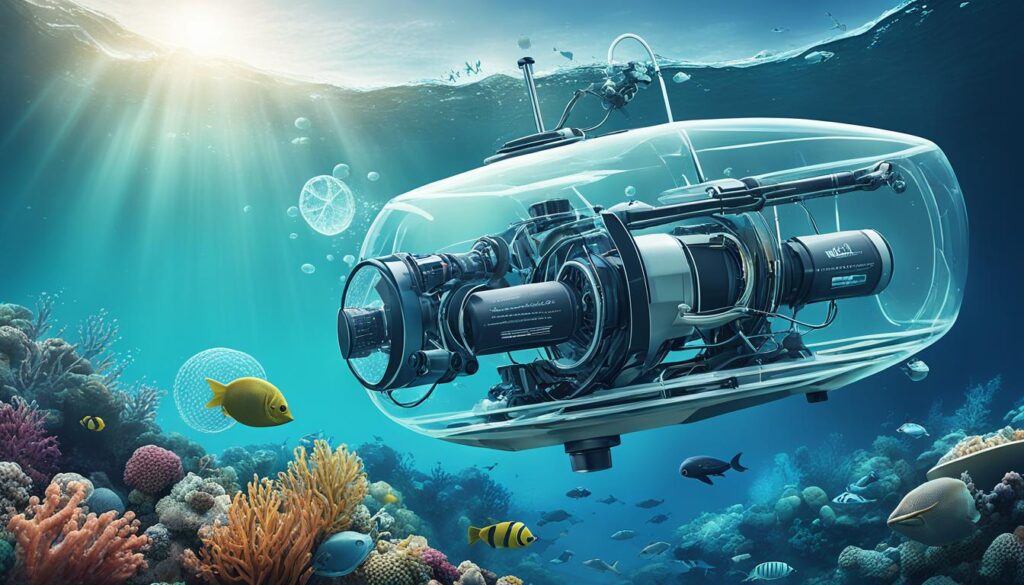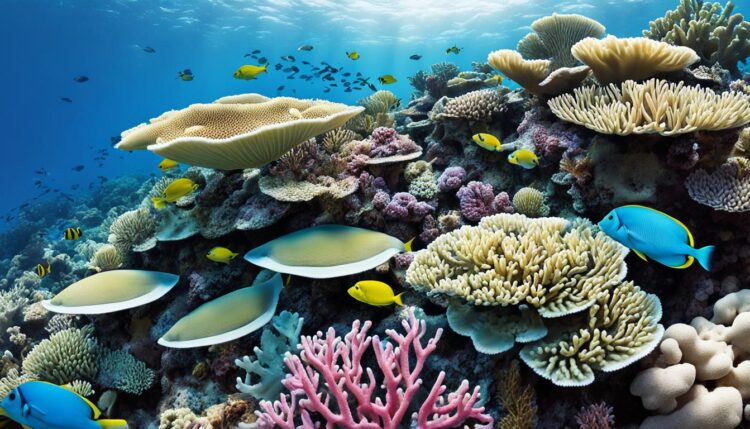Our oceans face an increasing array of threats, with marine pollution standing as a silent yet pervasive danger. One of the most insidious forms of marine pollution is ocean acidification, a direct consequence of excessive carbon dioxide emissions. This process lowers pH levels in the ocean, making it hostile for marine organisms that depend on calcium carbonate structures, such as corals and shellfish. These changes not only disrupt marine biodiversity but also lead to the decline of coral reefs, essential habitats for countless marine species.
Additionally, deforestation and nitrogen pollution from agriculture significantly exacerbate ocean acidification. The interconnectedness of Earth’s systems means that environmental issues on land can have profound impacts on our oceans. Therefore, implementing robust measures for environmental protection is crucial to safeguarding marine ecosystems.
Innovative clean-up technologies and scientific research are at the forefront of efforts to predict and mitigate these marine ecosystem threats. Alongside community-driven initiatives and sustainable lifestyle choices, these advancements hold promise for the future health of our oceans.
Key Takeaways
- Marine pollution, particularly ocean acidification, poses significant threats to marine biodiversity.
- Corals and shellfish are especially vulnerable due to their reliance on calcium carbonate.
- Deforestation and agricultural nitrogen pollution contribute to worsening ocean conditions.
- Advancements in clean-up technology and scientific research offer hope for mitigating future marine ecosystem threats.
- Community actions and sustainable lifestyles play pivotal roles in environmental protection.
The State of Our Oceans
The health of our oceans is in a precarious state, impacted by various forms of pollution. This pollution not only threatens marine biodiversity but also the economies of coastal communities that rely heavily on healthy oceans.
Current Health of Marine Ecosystems
Marine ecosystems are suffering from unprecedented degradation. Several factors, including plastic waste, carbon emissions, oil spills, and chemical discharges, are central to this declining health. Moreover, ocean acidification resulting from excessive carbon emissions is altering marine chemistry. This change is harmful to organisms and disrupts entire ecosystems, particularly affecting coral reefs and shellfish populations.
Main Threats and Their Origins
Among the primary threats our oceans face are coastal erosion, algal blooms, and the depletion of marine biodiversity. These threats mainly originate from both land-based and ocean-based sources. Accumulation of pollutants in marine environments, such as plastics and chemicals, has dire consequences for life beneath the water’s surface. Moreover, the phenomenon of ocean acidification intensifies the vulnerability of marine ecosystems.
| Main Threat | Origin | Impact |
|---|---|---|
| Coastal erosion | Climate change, human activities | Loss of habitats, altered coastlines |
| Algal Blooms | Nutrient pollution | Oxygen depletion, toxin release |
| Marine Biodiversity Loss | Overfishing, pollution | Reduced species richness, disrupted ecosystems |
Causes of Marine Pollution
Understanding the causes of marine pollution is fundamental to addressing its impacts on our oceans. Numerous human-induced activities contribute to this escalating environmental crisis.
Plastic Waste and Single-Use Items
The proliferation of single-use plastics has introduced millions of tons of waste into our oceans annually. These plastics degrade slowly, often breaking down into smaller particles called microplastics, which are ingested by marine organisms, causing severe health issues. Tackling this problem involves reducing our reliance on single-use items through increased recycling efforts and adopting alternatives like biodegradable materials.
Oil Spills and Chemical Discharges
Industrial activities such as oil drilling and transportation result in frequent oil spills, releasing toxic waste into marine environments. Additionally, chemical discharges from factories and agricultural runoff contaminate water bodies, leading to long-term ecological damage. Implementing stricter regulations and efficient waste management practices can mitigate these hazards.
Ocean Acidification from Carbon Emissions
Burning fossil fuels and industrial processes emit significant amounts of greenhouse gases, contributing to ocean acidification. This chemical shift in ocean water endangers marine life, particularly species like mollusks and corals, which rely on calcium carbonate for their structural integrity. Reducing greenhouse gas emissions and adopting sustainable energy solutions are crucial steps toward preserving ocean health.
| Cause | Source | Environmental Impact |
|---|---|---|
| Plastic Waste | Single-use plastics | Marine litter and ingestion by sea life |
| Oil Spills | Industrial activities | Contamination and long-term ecological damage |
| Ocean Acidification | Fossil fuel emissions | Threat to marine species dependent on calcium carbonate |
Impacts on Marine Wildlife
The impacts of marine pollution on wildlife are profound and varied. Coral reefs and shellfish are particularly affected by ocean acidification, which inhibits their ability to construct shells, leading to weakened structures and increased susceptibility to threats. Disruption to the marine food chain, resulting from declining populations of shell-forming species, has cascading effects on predators and affects biodiversity. Marine mammals and fish face numerous challenges due to altered habitats, diminished prey availability, and physiological and behavioral changes, all of which highlight the urgency of addressing pollution.
Effects on Shellfish and Coral Reefs
Shellfish and coral reefs are highly sensitive to changes in ocean chemistry. Ocean acidification, driven by increased carbon emissions, threatens these vital components of marine ecosystems. Without strong shells, shellfish can fall victim to predators and environmental stressors. Coral reefs, integral to marine protected areas, face similar challenges as they struggle to maintain their calcium carbonate structures, leading to a phenomenon known as coral bleaching.
Disruption of Marine Food Chains
Marine food chains are intricate and delicately balanced. The decline of shell-forming species caused by ecosystem degradation has far-reaching consequences. Predatory species relying on these organisms for sustenance face scarcity, which can lead to a decrease in biodiversity. Changes at the base of the food chain trickle up, impacting larger marine animals and altering the natural dynamics of aquatic conservation efforts.
Threats to Marine Mammals and Fish
Marine mammals and fish are directly influenced by the effects of pollution on their habitats. Altered water quality and contaminated food sources lead to physiological and behavioral changes. For instance, toxins can accumulate in their bodies, causing health issues and reducing reproductive success. Additionally, the destruction of habitats like seagrass beds and kelp forests, often found within marine protected areas, reduces safe zones and breeding grounds, thereby threatening their population stability.
Human Health and Economic Consequences
Marine pollution presents dire public health risks and substantial economic impact. Contaminated seafood is a significant concern, as pollutants can lead to serious health issues, including cancer and reproductive health impairments. Communities with high marine resource dependence are particularly vulnerable, facing not only health risks but also economic disruptions.
Coastal economies, heavily reliant on marine resources like fisheries, suffer from decreasing populations due to polluted environments. Particularly affected is the shellfish industry. Acidification impairs the growth of shells, leading to economic losses and reduced productivity. Effective and sustainable management of marine resources is essential to mitigate these issues, ensuring public health is protected and the economic vitality of communities is maintained.
To understand these impacts further, consider the following table detailing health risks and economic ramifications:
| Impact Type | Health Risks | Economic Ramifications |
|---|---|---|
| Contaminated Seafood | Cancer, Reproductive Health Issues | Decreased Seafood Market Value |
| Polluted Coastal Waters | Waterborne Diseases | Reduction in Tourism |
| Ocean Acidification | N/A | Impaired Shellfish Industry |
Addressing marine pollution proactively is crucial for safeguarding public health and maintaining the economic stability of communities that rely on marine resources. Collaborative efforts in sustainable resource management are key to ensuring a healthier and economically secure future.
Marine Pollution
Marine pollution is a significant environmental issue, encompassing a wide range of harmful substances and materials that contaminate our oceans. From macro to microplastics, chemical pollutants, heavy metals, and oil spills, the impact on marine ecosystems is profound. These ocean contaminants degrade marine habitats and disrupt the balance of marine life.
Plastic pollution is especially concerning, given its widespread presence and long decomposition rates. Single-use plastics degrade into microplastics, which are ingested by marine organisms, causing physical harm and introducing toxic chemicals into the food chain. Furthermore, plastic debris serves as a vessel for invasive species, exacerbating ecological imbalances.
In addressing marine pollution, efforts toward environmental sustainability are paramount. Implementing stricter waste management controls and fostering initiatives to reduce plastic usage can mitigate these harmful effects.
| Type of Pollutant | Source | Impact on Marine Life | Mitigation Measures |
|---|---|---|---|
| Macrosplastics | Single-Use Items | Entanglement and Ingestion | Reducing Plastic Production |
| Microplastics | Fragmentation of Larger Plastics | Toxic Chemical Introduction | Improved Waste Management |
| Oil Spills | Ship Accidents | Physical Smothering of Marine Life | Stronger Regulatory Frameworks |
| Chemical Discharges | Industrial Effluents | Toxicity to Marine Species | Eco-Friendly Industrial Practices |
Investing in solutions that advocate for environmental sustainability is critical in tackling the various aspects of marine pollution. Such measures ensure a healthier and more resilient ocean environment for future generations.
Research and Technological Solutions
As our understanding of marine pollution deepens, innovative advancements in environmental research and eco-technology become crucial. Addressing the multifaceted aspects of ocean health demands a combination of rigorous studies and cutting-edge technologies.

Advances in Scientific Studies
Recent years have witnessed significant breakthroughs in the realm of environmental research. Marine scientists are leveraging state-of-the-art tools to unravel the intricate effects pollutants like plastics and chemicals have on the ocean’s biology and chemistry. Through extensive field studies and laboratory experiments, these scientific endeavors propel our knowledge forward, aiding in the development of more effective conservation strategies.
Innovative Clean-Up Technologies
In the fight against marine pollution, eco-technology plays a pivotal role. Innovative approaches such as autonomous vehicles and advanced sensors are deployed to monitor and cleanse water bodies. These technological marvels enable efficient tracking and removal of pollutants, making our waters safer and healthier for marine life. Technologies such as The Ocean Cleanup’s interceptors have shown promising results in extracting plastic waste from rivers before it reaches the ocean.
Predictive Models for Future Conditions
Predictive modeling is an essential tool for anticipating and addressing the impacts of climate change on marine ecosystems. By utilizing complex algorithms and extensive datasets, scientists can forecast future ocean conditions under various scenarios of climate change adaption. These models serve as a critical resource for policymakers, helping to formulate proactive measures aimed at mitigating the adverse effects of changing oceanic environments.
Community and Individual Actions
Individuals and communities play a critical role in combating marine pollution. Through collective efforts and informed choices, we can drive substantial changes to preserve our oceans and ensure sustainable living for future generations. Below, we explore the significance of grassroots cleanup initiatives and personal plastic consumption reduction.
Grassroots Cleanup Efforts
Grassroots cleanup efforts embody the power of community-driven environmental activism. Local groups organize beach cleanups, river cleanups, and other initiatives to address marine pollution directly. These collective actions not only remove waste from critical habitats but also raise awareness and inspire others to participate in similar activities, fostering a culture of waste reduction and environmental stewardship.
Reducing Personal Plastic Consumption
On an individual level, making conscious decisions to reduce personal plastic consumption is vital. Opting for reusable items such as water bottles, shopping bags, and straws can significantly reduce the amount of single-use plastics entering our marine ecosystems. Additionally, practicing responsible waste management, like recycling and composting, aligns with sustainable living principles and supports broader environmental activism goals.
| Action | Environmental Impact |
|---|---|
| Participate in Local Cleanups | Direct removal of pollutants from natural habitats; community engagement |
| Use Reusable Products | Reduces single-use plastics; promotes sustainable living practices |
| Practice Responsible Waste Management | Minimizes landfill waste; enhances recycling efforts |
| Support Conservation Groups | Amplifies environmental advocacy; funds critical clean-up projects |
| Advocate for Policy Changes | Influences legislation for broader waste reduction initiatives |
Global Policies and Agreements
Global policies and agreements are essential tools in the battle against marine pollution. These international efforts are designed to address critical issues such as marine conservation and the sustenance of our oceanic resources.
One of the most significant international cooperation initiatives is the establishment of marine protected areas (MPAs). These MPAs play a crucial role in marine conservation by safeguarding biodiversity and protecting vulnerable marine habitats. The United Nations has proposed the “30×30” initiative, which aims to protect 30% of the world’s oceans by 2030, showcasing the importance of international efforts.
The Paris Climate Accord also contributes indirectly to the health of marine ecosystems. By reducing greenhouse gas emissions, this environmental policy helps mitigate ocean acidification, which poses a threat to marine life. Such environmental policy initiatives highlight the interconnectedness of global issues and emphasize the need for cohesive international cooperation.
Effective environmental policy also necessitates adherence to global commitments. This can be seen in cooperative agreements between nations, which facilitate better management and protection of our oceans. Adherence to these global commitments ensures the sustainable use of ocean resources and further reinforces the need for comprehensive marine conservation strategies.
“International cooperation and adherence to global commitments are essential for the effective management and protection of the world’s oceans.”
These agreements and policies are not standalone solutions, but they form the backbone of a global strategy to combat marine pollution. By working together, nations can pool resources and knowledge, reinforcing the importance of international cooperation in tackling this critical environmental challenge.
| Policy/Agreement | Description | Impact |
|---|---|---|
| Marine Protected Areas (MPAs) | Designated areas for protecting marine biodiversity | Enhanced marine conservation |
| “30×30” Initiative | Goal to protect 30% of the oceans by 2030 | Increased global marine protection |
| Paris Climate Accord | Global agreement to reduce greenhouse gas emissions | Indirect benefits to marine health |
Ultimately, global policies and agreements are indispensable in addressing the multifaceted issue of marine pollution. The success of these strategies hinges on robust international cooperation and unwavering commitment to environmental sustainability and marine conservation.
Conclusion
Ocean pollution remains one of the most pressing environmental concerns of our time. The degradation of marine ecosystems is a wake-up call for immediate and collective action. By delving into the root causes and understanding the far-reaching impacts on marine wildlife, human health, and economic stability, we can begin to address this formidable challenge. This comprehensive understanding sets the stage for advocating for ecological restoration and advancing future sustainability.
Scientific research plays a pivotal role in developing innovations to combat marine pollution. From pioneering clean-up technologies to creating predictive models for oceanic conditions, these advancements offer a beacon of hope. Community involvement also adds a strong layer of ocean stewardship. Grassroots cleanup initiatives and efforts to reduce individual plastic consumption demonstrate that every contribution, no matter how small, can lead to meaningful change.
Global policies and agreements are essential in setting a unified direction for marine conservation. By committing to international regulations and supporting global initiatives, we amplify our collective capacity for marine protection. Moving forward, sustainability must guide our actions as we strive for a world where marine life flourishes and our oceans are free of contaminants. The decisions we make today will dictate the survival of our oceans and the vibrant ecosystems they support, underscoring the significance of prompt and persistent action towards ecological restoration and future sustainability.












